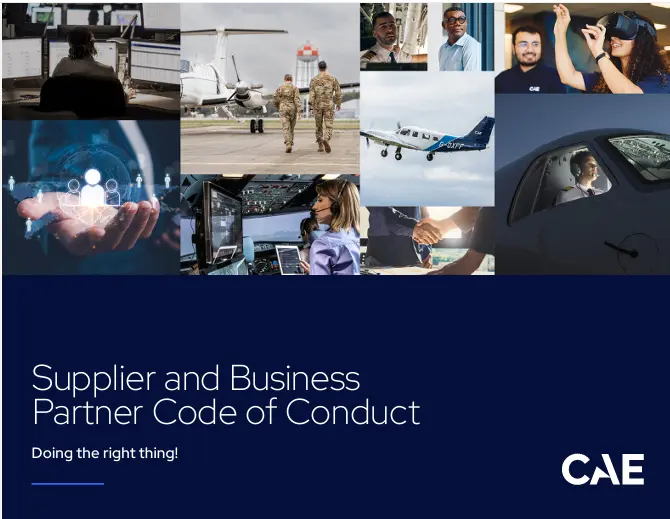



Read the CAE Supplier and Business Partner Code of Conduct to understand how our values, integrity and compliance extend throughout the supplier ecosystem.

In a time where sustainability initiatives are paramount, the pivotal role of suppliers cannot be overstated. In this panel, we shared invaluable insights about sustainability evaluations and how these insights can shape our collective journey towards a more sustainable supply chain and responsible future. View the recording here.
With 19,000 suppliers and close to $2 billion in annual purchases, CAE recognizes its social responsibility as a prime contractor. We have been working diligently to set up and execute purchasing policies that align with our commitment to diversity and inclusion (D&I) and reducing our carbon footprint.
We strive for having a diversified supply chain while joining the innovative movement to responsible and inclusive purchasing. Our objective is to meet our obligations, while being a corporate citizen and maintaining CAE’s competitiveness.
Interested in becoming a supplier? Please register using the link below.
Following an invitation, a new potential supplier will be requested to complete a form, including pertinent documentation, and submit it accordingly. A rigorous internal review process is conducted based on the information provided, resulting in the approval or rejection of the supplier. This process is under the responsibility of CAE’s Global Strategic Sourcing department.
A potential supplier may be requested to complete and/or provide documents such as the following:
The Terms and Conditions differ from one country to another. The Purchase Order indicates the proper selection.
Ces conditions sont variables selon le pays. Le bon de commande indique celles qui s’y appliquent.
Los Términos y Condiciones difieren de un país a otro. La Orden de Compra indica la selección adecuada.
De INKOOPORDER VOORWAARDEN kunnen per land verschillen. De toepasselijke versie wordt aangegeven in de inkooporder.
Following an invitation to become a supplier to CAE, the seller is requested to complete a new supplier request
In fiscal 2016, we became a signatory of the United Nations Global Compact and began integrating its 10 principles into our CSR approach. One of our first actions was to update our master agreement and request for proposals (RFP) templates in accordance with the UN Global Compact and the United Kingdom Modern Slavery Act. These documents now include compliance with laws prohibiting human trafficking and the use of child or forced labour.
Vendors are now also required to confirm that their code of ethics/business conduct aligns with our Code of Business Conduct commitments. They must demonstrate their social and environmental commitment and provide any related certifications. One of our next steps in aligning with the UN Global Compact is to develop a companywide Human Rights policy.
Seller shall support CAE in its obligation to conform to Section 1502 (the Conflict Minerals Statutory Provision) of the Dodd-Frank Wall Street Reform and Consumer Protection Act (the “Act”). Seller shall not use Conflict Minerals originating from the Democratic Republic of Congo (DRC) or Covered Countries in, or to produce Goods delivered to CAE, or in performing Services or Works in favor of CAE. “Conflict Minerals” and “Covered Countries” have the meaning ascribed to such terms in the Act.
In those limited circumstances where CAE’s product documentation or Specifications specifically call for the use of a Conflict Mineral or the PO is for the supply of solder containing tin, the following shall apply: (i) Seller whose Goods or Works contain Conflict Minerals that are necessary to the functionality or production of the Goods or Works manufactured or contracted to be manufactured shall adopt policies and establish systems to procure these minerals from sources that have been verified as “DRC conflict free”, (ii) Seller of such Goods or Works shall provide supporting data on its supply chains for Conflict Minerals to CAE on the EICC (Electronic Industry Citizen Coalition) Conflict Minerals Reporting Template. This report must be approved by CAE. Traceability data shall be maintained for 5 years minimum, (iii) Seller shall perform “Reasonable Country of Origin Inquiries” (RCOI) to ensure it has traceability throughout its supply chain to establish the origin of Conflict Minerals to designate one of the following sources or exemption: (a) the smelter (tin, tantalum, tungsten), or refiner (gold); Seller shall ensure that purchased metals originate from smelters validated by Seller as “DRC Conflict Free”, (b) scrap or recycled, or (c) the rule exempts any Conflict Minerals that are “outside the supply chain”. Conflict Minerals are outside the supply chain if, by January 31, 2013, they have been fully smelted or refined; or they are located outside the Covered Countries, and (iv) if, based on its RCOI, the Seller determines that its Conflict Minerals did originate from a Covered Country or has reason to believe that such minerals may have originated in a Covered Country and are not from recycled or scrap sources, it is required to develop and report to CAE what measures it will take to minimize the risk of purchasing “Not DRC Conflict Free” conflict minerals in the future. This report must be approved by CAE.
Seller agrees and shall ensure that Counterfeit Parts or supporting counterfeit documentation are not delivered to CAE. “Counterfeit Part” means a suspect part identified as a copy or substitute without the legal right or authority to do so or a part whose material, performance, or characteristics are knowingly misrepresented by a supplier in the supply chain. The intentional or unintentional use, incorporation, or delivery of Counterfeit Parts or counterfeit work is strictly prohibited. This includes it being provided either as an end item deliverable or as a component or subcomponent of an end item deliverable pursuant to these Terms and Conditions or under a PO. Seller shall maintain a documented system (policy, procedure, or other documented approach) that ensures traceability of all components, and shall provide copies of such documentation for its system to CAE upon request. If Seller furnishes CAE with any Counterfeit Part, CAE shall have the right to impound such items, and Seller shall promptly replace such items with items acceptable to CAE. In such case, Seller shall be liable to CAE for all costs relating to impoundment, removal, replacement and proof of physical destruction. CAE may withhold payment for any Counterfeit Part and may turn such items over to governmental authorities for investigation. This “Counterfeit Deliverables” clause applies whether Seller is a distributor that purchases parts with the intention to sell and redistribute them back into the market or not and whether the parts are obtained from original equipment manufacturers or contract manufacturers (typically from excess inventories), from other independent distributors or otherwise.